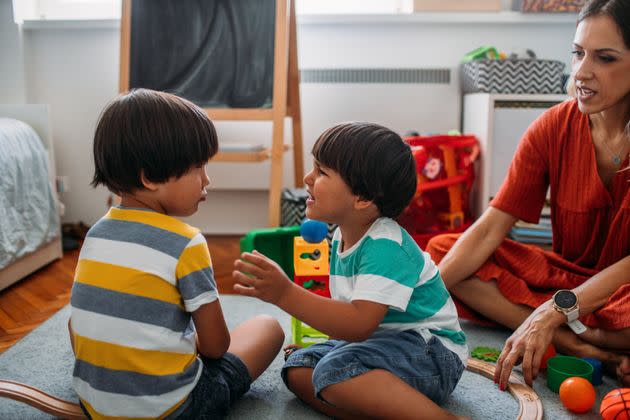Here's How To Put An End To A Sibling Rivalry Once And For All

Kim and Kourtney Kardashian and princes William and Harry are high-profile examples of people with sibling rivalries.
The best of friends. Frenemies at best. Our relationships with siblings are some of the most complicated we’ll ever have. Stuck With You is a HuffPost series that explores the nuances of sibling relationships.
From Marcia and Jan on “The Brady Bunch” to Kim and Kourtney Kardashian and Princes William and Harry, we’re inherently drawn to stories of sibling rivalry.
That might be because for many of us, stories of strife between sisters or brothers hit close to home. A 2001 study suggested that sibling rivalry usually peaks between the ages of 10 to 15 (academic competitiveness was the root cause of most of those rivalries), but the friction can linger into adulthood.In some cases, it causes periods of deep emotional estrangement. A German study from earlier this year found that 28% of respondents had at least one estrangement episode with a sibling.
Fern Schumer Chapman, the author of “Brothers, Sisters, Strangers: Sibling Estrangement and the Road to Reconciliation,” thinks it’s natural for sibling relationships to wax and wane throughout the course of a life.
“In childhood, our brothers and sisters are our first playmates, instilling in one another necessary social qualities ― tolerance, generosity, loyalty ― that eventually affect relationships with friends, colleagues and romantic partners,” she said.
“As therapist Karen Gail Lewis said, the early sibling relationship really is ‘a laboratory for all subsequent relationships,’” Schumer Chapman added. “As adults, when people find themselves in conflict, they often revert to the skills or patterns they established with siblings in childhood.”
Adults may default to “sibling transference,” unconsciously treating others as if they were a sibling, Schumer Chapman explained. “The sibling dynamic can appear in partner relationships, friendships, even co-worker interactions.”
Joshua Coleman, a psychologist in the San Francisco area who specializes in estrangement and parental alienation, agrees that sibling rivalries are hard to avoid, even if parents are fair-minded and well-intentioned.
“Parental attention is a relatively limited resource and children have their own needs. Kids are constantly thinking about how to occupy that niche, sometimes consciously, often, unconsciously,” he said. “So, that’s why sibling rivalry can occur even in the context of good parents.”

Sibling rivalries can happen naturally, but some parents do a lot to perpetuate arguments and set up their children for long-standing sibling antagonism.
A little sibling rivalry can even be a healthy thing, Coleman said, pointing to the example of Venus and Serena Williams, whose father, Richard Dove Williams Jr., pushed them both to excellence.
“That’s true of any kind of rivalry where you try even harder because someone provides an example of an ideal, or what to aspire to,” he said. “If one sibling is particularly good at, say, a sport or academics or a musical instrument, a rivalry may occur in the spirit of affection or closeness.”
That said, some parents do perpetuate friction between their kids, setting them up for long-standing sibling antagonism. Schumer Chapman said parents subtly ― or not so subtly ― encourage rivalries when labeling and promoting roles that polarize siblings (“the athletic one,” “the brains of the family”) or triangulating among the kids (for instance, a parent might pass information about how they feel about one child to another). Providing money or gifts to one child and not the other without explanation is another common cause for rivalries.
“Even something as seemingly innocuous as seeking guidance from one child and not the other can create resentment into adulthood,” Schumer Chapman said.
Can sibling rivalries naturally fizzle out?
Generally, priorities change, and adult siblings don’t have the emotional wherewithal or time to engage in the one-upmanship of the past, said Kiaundra Jackson, a marriage and family therapist in Los Angeles.
But when the competition doesn’t fizzle out, everyone in the family inevitably deals with the blowback.
“If it’s ongoing, sometimes going no-contact is the most healthy option for people,” Jackson said. “Just because someone is blood-related doesn’t mean you have to stay in an unhealthy or toxic relationship.”
But generally, healing is possible if one party is willing to make the overture to make amends, she said.
“Instead of continuing with this rivalry dynamic, someone needs to be willing to say, ‘Well, what happened? What did I do? How can I fix this? How can we do this? How can we do better?’” she said. “Then hopefully, both parties will take some type of responsibility to reaching that goal.”

“Often, while hearing their sibling’s perspective, the siblings cry. Each is surprised to learn of the hurts the other suffered,” said Fern Schumer Chapman, author of "Brothers, Sisters, Strangers: Sibling Estrangement and the Road to Reconciliation."
How To Take Some Of The Tension Out Of A Sibling Rivalry In Adulthood
If repairing the relationship is your goal, our experts shared some ways to heal the relationship.
Ask yourself: What purpose does this serve today?
John Duffy, a psychologist and author of “Parenting the New Teen in the Age of Anxiety,” has worked with a number of young adults who carry rivalry with one or more siblings into adulthood.
“In my office, we talk through the purpose the rivalry served when they were children. They often indicate that the rivalry was motivating and inspiring at the time, but when we consider whether the rivalry continues to serve that purpose, it never does,” he told HuffPost. “It just drives a wedge in a relationship that would otherwise be friendly and collegial.”
If you’re going to talk, lead with sympathy, not criticism.
Peace talks will fall apart fast if you go into them looking to outline all the wrongs and hurts you’ve suffered through the years. You want to communicate your feelings in a way that causes your sibling to feel interested or sympathetic, rather than criticized and hurt, Coleman said.
“If you just come in and talk about how abusive or narcissistic or toxic or whatever your sibling was, they’re probably not going to be very interested in what you have to say,” he said. “They’ll just get defensive.”
But if you say something, like, “You know, I would like to have a closer relationship with you,” they’re likely to be more receptive, he said.
“From there, you might say, ‘There are certain behaviors that you engage in with me ― perhaps I do with you as well ― that I find hurtful. Is that something that we can talk about and work on together? Can I give you more feedback about what I find hurtful or difficult or disruptive between us?’”

If you’re dealing with sibling rivalry as an adult, ask yourself what purpose that rivalry serves today.
Look for a core misunderstanding you can hash out.
Duffy often finds that ongoing adult sibling rivalry is often based on a singular misunderstanding that festers over time. If there’s something specific you can address, lead with that and try to keep the conversation hyper-focused on it.
“I’ve worked with many adults who have finally called a truce with their sibling after clearing up a misunderstanding about money, attention or whatever else might have gotten in the way of their healthy relationship,” he said.
Get ready to do a lot of listening.
This isn’t a one-way talk. Siblings who struggle with deep rivalry have to be equally committed to listening to each other. That could mean finding a therapist to explore your issues. If you choose to work it out by yourselves, one party should sit in silence and listen while the other talks about how rivalrous or bullying behavior has affected them through the years, Schumer Chapman said.
Some questions you can mull, according to the therapist?
What weren’t you getting that you felt you needed?
Why did you feel the need to compete or bully?
What did it feel like to be in such intense competition or bullied? How did it make you see yourself?
“Often, while hearing their sibling’s perspective, the siblings cry. Each is surprised to learn of the hurts the other suffered,” Schumer Chapman said.
“Siblings may discover the truth of their separate stories and see themselves as part of a larger dysfunction,” she said. “When you truly hear one another, you can honor each other’s dignity and strengthen your own.”

